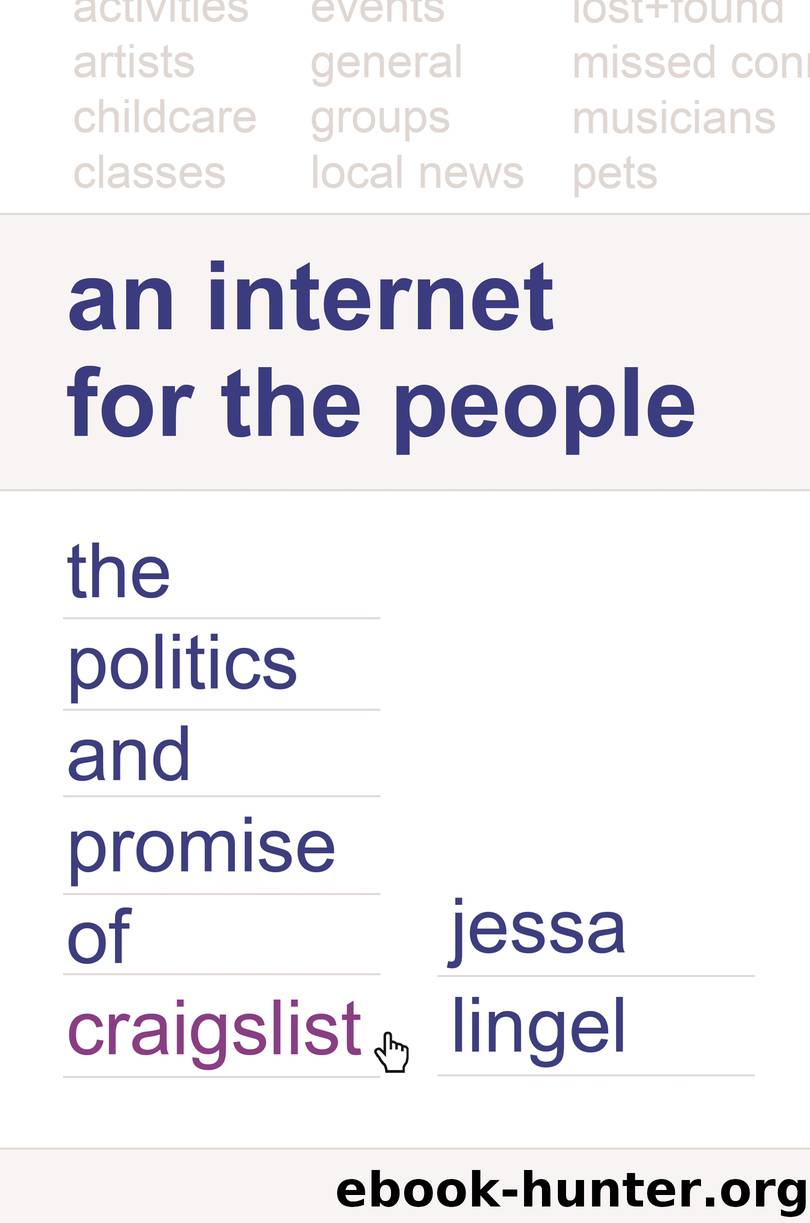An Internet for the People by Jessa Lingel;

Author:Jessa Lingel;
Language: eng
Format: epub
Publisher: Princeton University Press
Published: 2019-12-03T16:00:00+00:00
Craigslist and the Politics of Class
Early narratives about the internet emphasized egalitarianism through access, where anyone could learn new things and create new content. But promises of egalitarianism and empowerment have fallen flat, amid reports of online discrimination around gender (Rybas and Gajjala 2007), nationality (Burrell 2012), race (Nakamura 1995), sexuality (Gray 2009), and class. Surprisingly little has been written about class discrimination online or the ways that class shapes perceptions of the web. To be clear, a lot has been written about the digital divide, meaning the social, cultural, and economic implications of having versus not having access to the internet (e.g., Cullen 2001; Norris 2001; Van Dijk and Hacker 2003). Digital-divide research has helped shape important policies on tech infrastructure and education, but this scholarship has generally produced narratives that tend to emphasize access to rather than perceptions of digital technology.2 Put another way, studies on the digital divide tend to assume that once everyone has access to technology, differences in their backgrounds will drop out. But differences in class and background matter when it comes to not just whether people use technology but how. Beyond studying socioeconomic and class implications of access to technology, what are the implications of associating certain platforms with a lower socioeconomic status? For example, what do people mean when they call craigslist the poor-people’s internet?
Across interviews, I heard links between craigslist and the working class.3 Thinking about class politics sheds light on many features and functions of craigslist, but emerges most saliently around work. As Savage and his coauthors (2013) argued, class labels are about more than income. The kind of job someone has can matter more than salary: an electrician can make more than an office manager but still be perceived as working class (and low status) rather than white collar (and high status). Status is about more than one’s job, and can change as a person moves from one setting to another. For example, the same person could work as a janitor, and thus have little status at work, but could also serve as a deacon at church, giving him high status. In the United States, assumptions about class pull from many factors, including education, speech, dress, and social connections. But within the combination of factors tied to class, employment is often key.
Thousands of full-time, highly skilled, and professional jobs with benefits are advertised on craigslist every day. Yet like many people I spoke with, Agnes saw craigslist as a good place to find a gig but not a career:
Maybe with looking for jobs, [craigslist] definitely makes it more … casual, and less intense. Like they don’t really care who you really are. It’s more likely to be more lame jobs, or, like, easy, no-experience-required-type jobs. Which is fine if that’s what you’re looking for, but if you’re trying to find a real job, [craigslist] is not really the best place necessarily for that.
Download
This site does not store any files on its server. We only index and link to content provided by other sites. Please contact the content providers to delete copyright contents if any and email us, we'll remove relevant links or contents immediately.
Pioneering Portfolio Management by David F. Swensen(6301)
Man-made Catastrophes and Risk Information Concealment by Dmitry Chernov & Didier Sornette(6019)
Zero to One by Peter Thiel(5802)
The Motivation Myth by Jeff Haden(5213)
The Miracle Morning by Hal Elrod(4728)
Elon Musk by Ashlee Vance(4128)
Unlabel: Selling You Without Selling Out by Marc Ecko(3663)
The Art of Persistence: Stop Quitting, Ignore Shiny Objects and Climb Your Way to Success by Michal Stawicki(3661)
Delivering Happiness by Tony Hsieh(3426)
Urban Outlaw by Magnus Walker(3400)
Purple Cow by Seth Godin(3205)
The Marketing Plan Handbook: Develop Big-Picture Marketing Plans for Pennies on the Dollar by Robert W. Bly(3064)
Mastering Bitcoin: Programming the Open Blockchain by Andreas M. Antonopoulos(3046)
The Power of Broke by Daymond John(2988)
The Content Trap by Bharat Anand(2927)
Applied Empathy by Michael Ventura(2904)
The Airbnb Story by Leigh Gallagher(2857)
Keep Going by Austin Kleon(2763)
Radical Candor by Kim Scott(2724)
